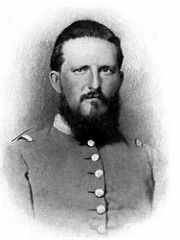Centreville, Va., November 3, 1861.
The Frenchman and the wheat crop give you a peck of trouble, but you have the gratification of knowing you are not alone in your misery. We have occasionally some little of it here. Night before last and yesterday, for instance, we had a storm of wind and rain which blew over many of the tents, turning their inmates out in the weather, and rendering it almost impossible to cook anything to eat. We thought it bad enough here, but I doubt not those regiments which were on picket without tents fared even worse than we did here. If you who have brick houses and dry quarters to live in have your troubles, those of us here fare worse. This is poor consolation, it is true. I thought when I came here that I was settled for a while at least as Major of the regiment, but last week I got an order from Gen. Smith to take charge of the roads used by the army and have them put in repair. The appointment implied an opinion that I possess the energy and industry to have the work done, and I am gratified so far as the compliment; but it is a post which involves much hard work and affords no opportunity for winning laurels. It is, however, a post of much importance, and I shall spare no effort to justify the favorable opinion which induced my appointment.
The wind blows cold, Love, and as I write in my tent without fire, I will draw my letter to a close. Say to your father that the cloth is just suited to the purpose for which I need the coat this winter–out-of-door life in all sorts of weather. I have another message which I have thought for some time of sending him. It is this: the principal part of my estate consists of land in Ohio, the loss of which–and I have but little hope of anything else– breaks me. My other property, under the depreciation which the war is likely to produce, will not pay my debts. I think proper to communicate this, so that if he thinks proper to change his will, he can do so and make such provision for you as he deems best. The future is dark enough, I am sure; but I shall go on here in a faithful discharge of my duties, trusting that it may some day be brighter.
